Photographs: Reuters
Narendra Modi-led government included neither a 100-day agenda nor its five-year programme of action in the speech it had approved for the president to read out at the joint session of Parliament, says A K Bhattacharya.
The first thing you are likely to notice about the address President Pranab Mukherjee delivered to Parliament on Monday is its length. It has 50 paragraphs, to be precise. Five years ago, Pratibha Patil’s address to a similar session at the start of the 15th Lok Sabha had 46 paragraphs.
Yet, Mr Mukherjee’s speech was shorter than that of his predecessor by over 500 words.
It may sound trivial, but why fewer paragraphs managed to contain more words is a pointer to a key difference between the two speeches - one delivered on behalf of the Manmohan Singh government and the other on behalf of the current government led by Narendra Modi.
As it happens, two paragraphs in the president’s address in 2009 were unusually longer than the other paragraphs. And this was because one of these paragraphs had listed as many as 24 specific policy promises that the government led by the United Progressive Alliance, or UPA, was committed to fulfil in the first 100 days in office.
The other paragraph had listed 10 long-term objectives of the UPA government to be achieved over the five years of its tenure.
…
Will India shine again under the Modi govt?
Photographs: Reuters
In other words, a 100-day agenda and a five-year programme were key elements in Pratibha Patil’s address in 2009 that made it longer than the one delivered five years later by Pranab Mukherjee last Monday.
In sharp contrast, the Narendra Modi-led government included neither a 100-day agenda nor its five-year programme of action in the speech it had approved for the president to read out at the joint session of Parliament.
This is perhaps in keeping with Mr Modi’s belief that the government should not be judged by what it can achieve in 100 days. But why are there no promises that the government would fulfil before the end of its five-year tenure?
Though many new policies, projects and schemes have been listed in the president’s address, there are no timelines or commitment made as to when those should be executed, completed or implemented.
While the UPA government could be faulted for not having fulfilled some of its 100-day agenda, no such opportunity will exist for critics of the Modi government.
There are only two exceptions to the government’s general reluctance to commit itself to a time-bound action plan. One such promise pertains to ensuring that by 2022 every family in the country will have a pucca house with water connection, toilet facilities and access to 24-hour electricity supply.
…
Will India shine again under the Modi govt?
Image: Prime Minister Narendra ModiPhotographs: Reuters
The target date for fulfilling this promise, mind you, will coincide with the 75th year after India’s independence and more than three years after the end of the current tenure of the Modi government.
The second time-bound promise is to launch a “Swachh Bharat Mission” to ensure hygiene, waste management and sanitation across the country. There is a hint that the target date for completing this project would be 2019 to coincide with the celebrations of Mahatma Gandhi’s 150th birth anniversary.
The president’s address should be noted for three more specific reasons. One, the entire speech makes no reference to the UPA’s flagship scheme Aadhaar or the Unique Identification Authority of India.
…
Will India shine again under the Modi govt?
Image: Village women stand in a queue to get themselves enrolled for the Unique Identification (UID) database system at Merta district in Rajasthan.Photographs: Mansi Thapliyal/Reuters
Nor is there any mention of the government’s stance on subsidies on food, fertilisers and fuel. Remember that the Aadhaar scheme was introduced to transfer subsidies to the real and needy beneficiaries directly without any leakage or misuse.
What does this mean for the Modi government’s approach to subsidies and the future of Aadhaar? Both are crucial issues. Subsidies, at present poorly targeted, should be pruned and thousands of crores of rupees, already spent on the unique identity-based subsidies transfer scheme of Aadhaar, cannot be allowed to go waste.
Two, the Modi government will work towards strengthening bodies like the National Development Council and the Inter-State Council to help it actively engage with the states on national issues.
…
Will India shine again under the Modi govt?
Photographs: Reuters
This is in keeping with Mr Modi’s belief that the prime minister must work in close co-ordination with chief ministers. That is why there is now talk of achieving rapid progress of states through “co-operative federalism”.
But in this approach the role of the Planning Commission seems to have been underplayed and even ignored. In the past several decades, the Planning Commission has functioned as a body to co-ordinate with states on national policies.
The view within the Modi government is that the Planning Commission did not play its role effectively and so it could be downsized. The president’s address seems to be a clear sign of the diminished role for the Planning Commission in the days to come.
Three, the president’s address refers to the need to rationalise and simplify the tax regime to make it “non-adversarial and conducive to investment, enterprise and growth”.
…
Will India shine again under the Modi govt?
Photographs: Reuters
This is a clear indication that the revenue department’s approach to tax collection will undergo a change.
Industry has been complaining for long that tax collectors have been driven largely by the pressure to meet the revenue targets they have been given at the start of the year.
There are official committee reports that have recommended a clear action plan to make the tax regime non-adversarial. It is not just Vodafone, engaged with the government over a long-drawn-out tax battle; several other taxpaying entities too would benefit from such an approach.
In sum, the Modi government has not tied itself down to any time-bound targets for implementing its programmes, but its economic agenda as outlined in the president’s address has given many pointers to the kind of policy regime that we will see in the coming months.

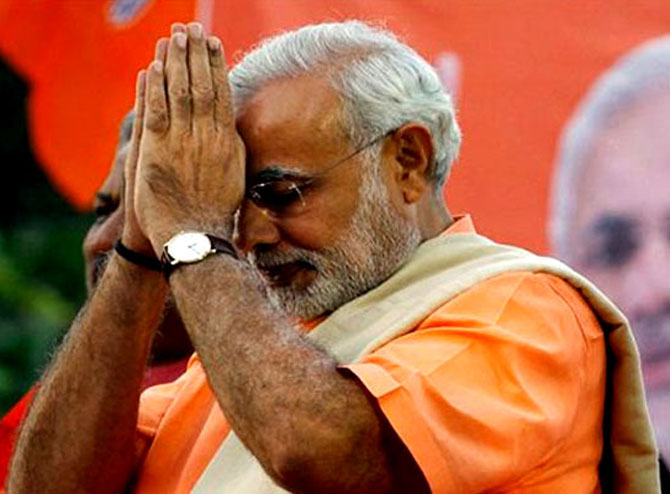
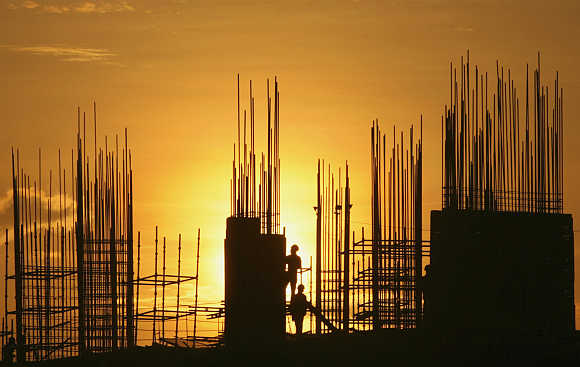
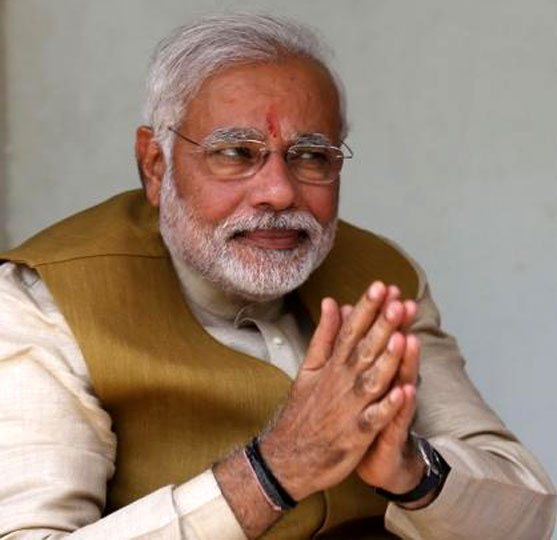
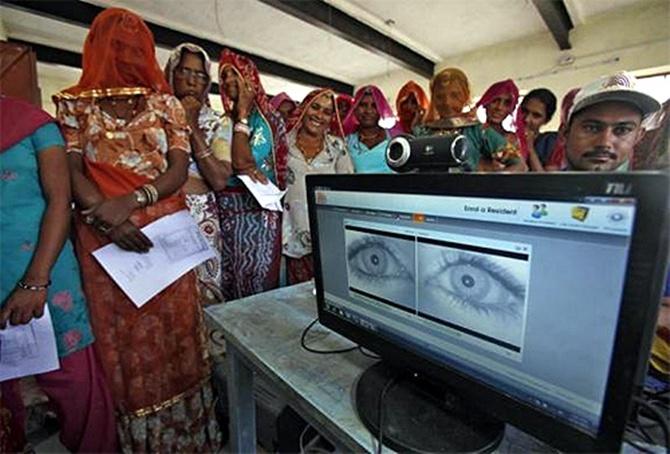
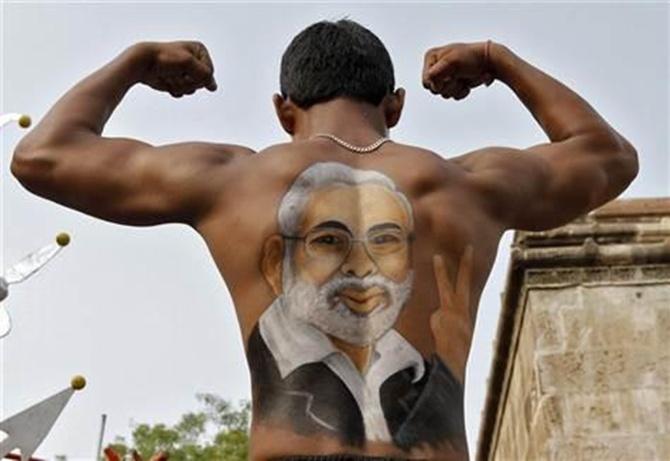
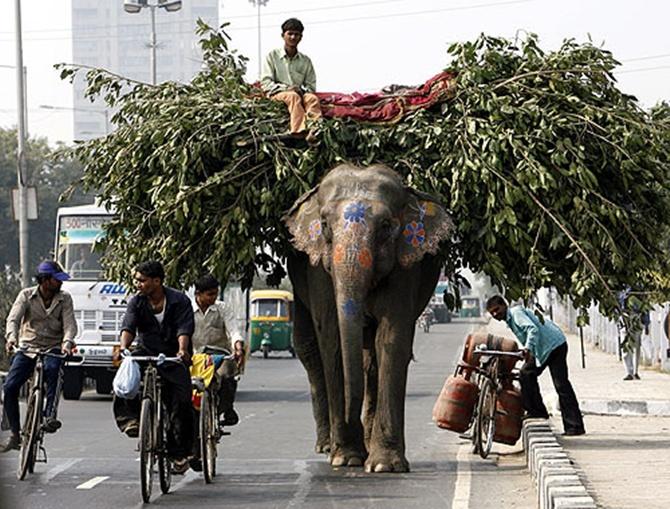
article